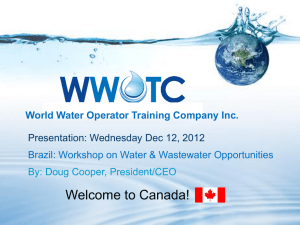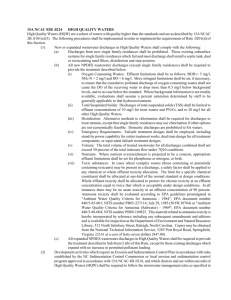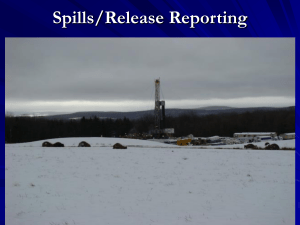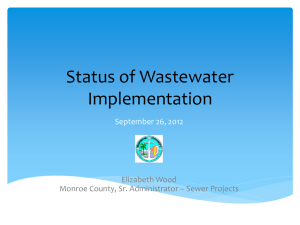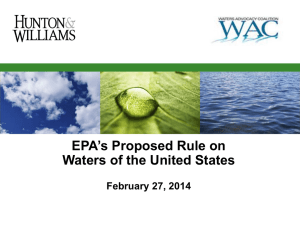Cudjoe Regional Wastewater Treatment System
advertisement
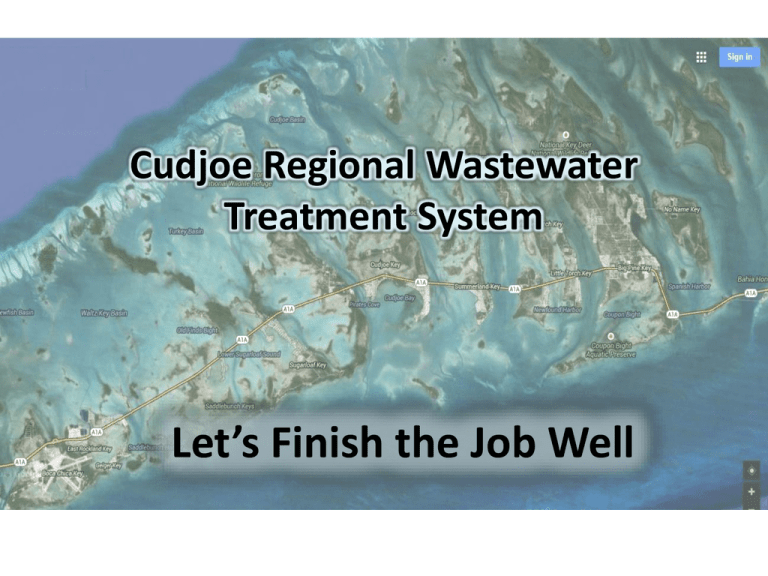
Cudjoe Regional Wastewater Treatment System Let’s Finish the Job Well Wastewater injected in shallow wells moves to surface waters Florida Keys National Marine Sanctuary Water Quality Protection Program 2013 Report to Congress (pg. 22) “Wastewater disposed into a shallow injection well can rise toward the surface and contaminate residential canals and other near- shore waters as shown in this experiment using viral particles as tracers (Paul 1997).” Wastewater injected in shallow wells moves to surface waters “Groundwater movement in the Florida Keys is quite different than most coastal systems. Groundwater and surface waters continuously interact due to the porous nature of the water table aquifer. “ “When tides are high in the Atlantic, Atlantic surface water is pushed into the subsurface and groundwater flows toward Florida Bay. When tides are low, groundwater flows toward the ocean. This continual sloshing of groundwater controls the overall path of the injected wastewater and septic effluent in the subsurface, thus increasing the possibility of surface water contamination.” “Submarine Groundwater Discharge, An Unseen Yet Potentially Important Coastal Phenomenon”, Corbett, Burnett, Chanton (National Sea Grant College Program of NOAA) at page 5. Wastewater injected in shallow wells moves to surface waters “After injection into a well, the less dense buoyant wastewater plume rises toward the surface.” CRWWTP is sited at a closed landfill “Results demonstrated that wastewater is rapidly transported upward toward the surface and laterally, which delivers tracers placed into injection wells to nearby surface waters after several days to weeks…” Kevin Dillon, Gulf Coast Research Laboratory, Ocean Springs, Mississippi Tropical Connections, page 143 (2012) Lower Keys Waters Require Very Low Nutrient Levels “The Florida Keys coral and seagrass communities are dependent on very low nutrient conditions. Any increases in nutrient loading results in the beginning of changes in the biotic community and can ultimately result in green water (high chlorophyll) and/or smothering of hard bottom communities by benthic algae.” William L. Kruczynski, Ph.D. Retired EPA Scientist Florida Law acknowledges the unique geology and fragile waters of the FKNMS Chapter 99-395 Laws of Florida Sec. 6. Sewage Disposal Requirements for Monroe County • Legislature finds that the discharge of domestic wastewater compromises the quality of the coastal environment of the Florida Keys • Reflects DEP’s finding that excessive nutrients constitute one the of the most severe water quality problems facing the State. Particular attention should be given to protect those waters presently containing very low nutrient concentrations. Minimum Disposal Requirement: Provide reasonable assurance of no harm to surface waters If Design Capacity is 1 mgd or more: • Deep well is mandatory If Design Capacity is under 1 mgd: • … “ wells designed to inject domestic wastewater in Monroe County shall be required as part of the operation permit application to provide reasonable assurance that operation of the well will not cause or contribute to a violation of surface waters standards” 6-528-630(7) F.A.C. • …DEP shall order the point or method of discharge changed “if it is demonstrated that a discharge, even if …otherwise in compliance…, will cause or contribute to a violation of state water quality standards…” FS. 403-086(10)(h) Deep Well and 1 MGD: It is all about the Money Monroe County Sanitary Master Plan (2000) . “Deep well injection is mandated in Monroe County for effluent discharged from plants of 1 mgd capacity and greater. Because deep well injection eliminates all wastewater nutrients from the environment, deep well injection was also evaluated for the 0.5 mgd plant size but was found to be more expensive than shallow well injection.” Pg 3-22. (width of wells not to scale) AWT leaves nutrients in the water far in excess of DEP Water Quality Standards for Lower Keys. “The total nitrogen (TN) and total phosphorus levels in the back country waters nearby are already too high… The addition of any further TN and TP loads will contribute to violation of numerical nutrient standards recently adopted by DEP.” Brian Lapointe, Ph.D. June 12, 2014 DEP’s Water Quality Standards for the Lower Keys vs. AWT Nutrient Levels 7 6.00 6 MG / L 5 Phosphorous 4 3.00 3 2.00 2 1 Nitrogen 1.00 0.21 0.008 0 DEP WATER QUALITY STANDARDS CRWS Permit Limits: Annual Average CRWS Permit Limits: Single Sample TOTAL PHOSPHOROUS MG/L DEP WATER QUALITY STANDARDS CRWS Permit Limits: Annual Average CRWS Permit Limits: Single Sample TOTAL NITROGEN MG/L Although AWT will result in a net reduction of nutrients from the FKNMS as a whole … …the regional concentration will harm local waters. RAMP-UP FLOW PROJECTIONS (MGD) 2.50 2.35 1.99 2.00 1.50 1.00 1.44 1.18 1.07 .94 1.00 .89 .72 .80 .58 0.50 0.00 2015 2016 2017 2018 2019 2020 2021 2022 2023 2024 Design Year 2028 AADF TMADF Maximum Month Peak Day Even relatively small levels of discharge during the expected ramp up period … can impact the surface waters of the Cudjoe Basin. Brian Lapoint, Ph.D. RAMP-UP FLOW PROJECTIONS (MGD) 2.50 2.35 2.26 2.20 2.21 2.22 2.24 2.25 1.99 2.00 1.44 1.50 1.10 1.11 1.11 1.12 1.12 1.13 1.00 1.00 0.89 0.72 0.91 0.66 0.80 0.50 0.45 0.35 0.41 1.00 1.01 1.01 1.02 1.02 1.03 0.88 0.89 0.89 0.89 0.90 0.90 1.18 1.07 0.94 0.58 0.17 0.36 0.16 0.00 0.14 2015 2016 2017 2018 2019 2020 2021 2022 2023 2024 Design Year 2028 AADF TMADF Maximum Month Peak Day Even relatively small levels of discharge during the expected ramp up period … can impact the surface waters of the Cudjoe Basin. Brian Lapointe, Ph. D. Cudjoe Regional Wastewater Treatment System Let’s Finish the Job Well



